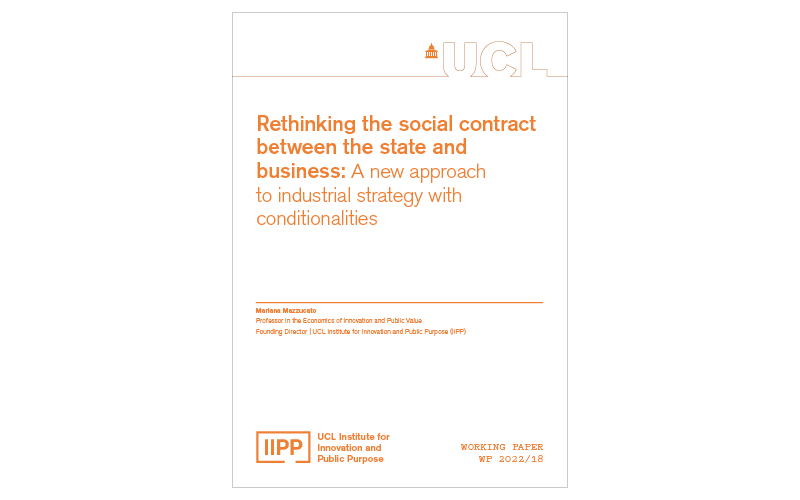Rethinking the social contract between the state and business
This working paper calls for new economic thinking. It summarises how leveraging conditionalities in a challenge-driven and outcomes-oriented way can help direct innovation and shape markets.

2 November 2022
Rethinking the social contract between the state and business: A new approach to industrial strategy with conditionalities
UCL Institute for Innovation and Public Purpose (IIPP) Working Paper Series: IIPP WP 2022/18
Author:
- Mariana Mazzucato | Founding Director and Professor in the Economics of Innovation and Public Value, UCL Institute for Innovation and Public Purpose (IIPP)
Reference:
Mazzucato, M. (2022). Rethinking the social contract between the state and business: A new approach to industrial strategy with conditionalities. UCL Institute for Innovation and Public Purpose, Working Paper Series (IIPP WP 2022-18). https://www.ucl.ac.uk/bartlett/public-purpose/wp2022-18.
Abstract:
Governments around the world are embracing industrial strategy to foster innovation and economic growth. To ensure this growth is inclusive and sustainable, investments must be directed towards clear goals and made conditional on recipients meeting requirements aligned with these goals - such as a just green transition. This working paper explores the opportunity for the governments to leverage conditionalities to shape and direct public funding, with a view to maximising the public value of this funding. This means redesigning the very contracts that define the relationship between the public and private sectors. This working paper considers six international cases from various countries - Germany, France, UK, South Korea, Scotland and Israel - to analyse how conditionalities have been designed, implemented, and governed to stimulate innovation and investment that contributes to inclusive and sustainable growth. Specifically, these cases outline four ways in which conditionalities can be leveraged: namely, to (1) increase access to goods and services, (2) direct investment towards climate-friendly goals, (3) profit-share with a wider range of stakeholders, and (4) reinvest in productive business activities, such as R&D and worker training.
 Close
Close

